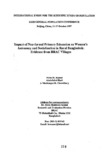| dc.contributor.author | Kamal, Firoz M. | |
| dc.contributor.author | Hadi, Abdullahel | |
| dc.contributor.author | Chowdhury, A Mushtaque R. | |
| dc.date.accessioned | 2019-12-08T10:43:58Z | |
| dc.date.available | 2019-12-08T10:43:58Z | |
| dc.date.issued | 1997-10 | |
| dc.identifier.citation | Farashuddin, F. M. K., Hadi, A., & Chowdhury, A. M. R. (1997, October). Impact of non-formal primary education on women’s autonomy and socialisation in rural Bangladesh: evidence from BRAC villages. Research Reports (1997): Social Studies, Vol – XVI, 210–221. | en_US |
| dc.identifier.uri | http://hdl.handle.net/10361/13225 | |
| dc.description.abstract | This paper investigates the impact of non-formal primary education programme of BRAC on
women's autonomy and socialisation. The study was conducted in 87 villages in Manikganj district
of central Bangladesh. The data were collected in 1995 through a sample survey of 744 married
women belonging to the following three categories: i. BRAC school graduates who completed full
three years of education; ii. formal school students who completed third grade and discontinued; and
iii. women with no schooling. Woman's autonomy was measured by the extent by which she
exercised her rights in five different areas of family life, viz. i. decision making power on
contraception, ii. schooling of children, iii. buying right of essential items, iv. provision of free
expression of opinion in front of her husband, and v. husband's acceptance of such right for her
wife. Socialisation is measured by woman's autonomy, adaptability in the family and the extent of
her interaction with the surrounding environment. The multivariate analysis reveals that the nonformal
primary education provided by BRAC is more contributive to women's autonomy and ·
socialisation than its cOunterpart who bad formal schooling (p<O.Ol). Women having exposure to
non-formal education are more likely to have delayed marriage and associate with organisations like
NGOs (p<O.Ol). The non-formal education has no positive impact on contraception. BRAC model
of non-formal education provides a feasible and sustainable alternative paradigm for promoting
women's autonomy and socialisation, along with its customary contribution to attaining universal
primary education. | en_US |
| dc.language.iso | en | en_US |
| dc.publisher | BRAC Research and Evaluation Division (RED) | en_US |
| dc.subject | Education | en_US |
| dc.subject | Adolescent girls | en_US |
| dc.subject | Socialisation | en_US |
| dc.subject | Autonomy | en_US |
| dc.subject | Marital age | en_US |
| dc.subject | Contraception | en_US |
| dc.subject | BRAC | en_US |
| dc.subject.lcsh | Non Formal Primary Education--Bangladesh. | |
| dc.subject.lcsh | Non-governmental organizations -- Bangladesh. | |
| dc.subject.lcsh | Women -- Bangladesh -- Social conditions -- Congresses. | |
| dc.title | Impact of non-formal primary education on women's autonomy and socialisation in rural Bangladesh: evidence from BRAC villages | en_US |
| dc.type | Research report | en_US |

